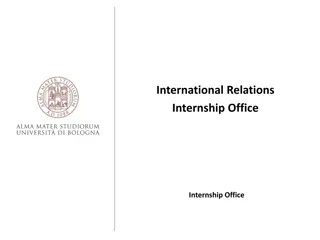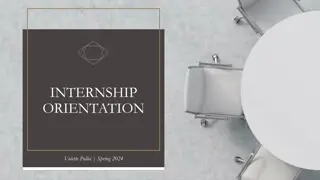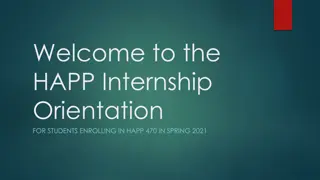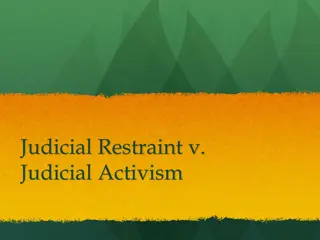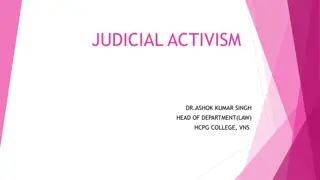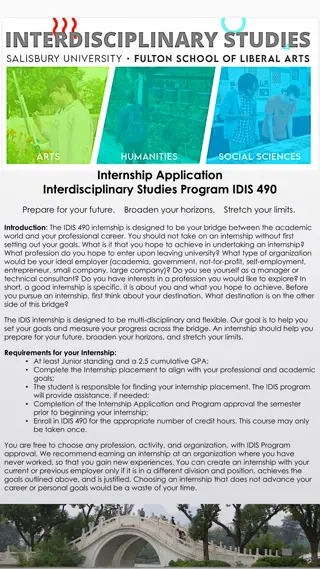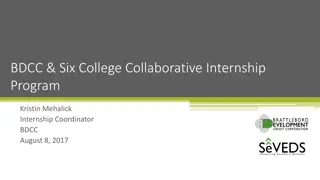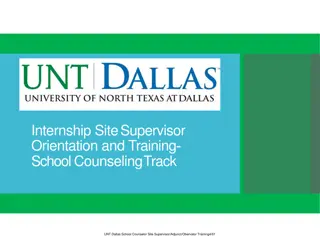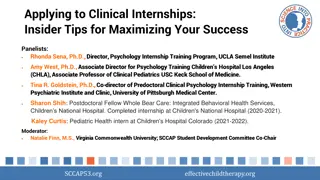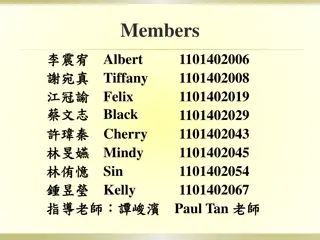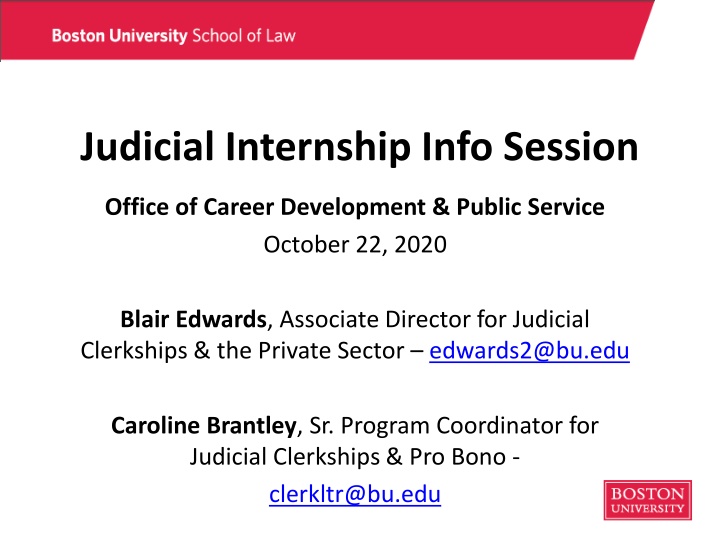
Insights into Judicial Internships: Benefits, Opportunities & More
Discover the world of judicial internships through an informative session covering its benefits, application process, locations, skills gained, and funding options. Learn how to secure a valuable experience for your legal career.
Uploaded on | 1 Views
Download Presentation

Please find below an Image/Link to download the presentation.
The content on the website is provided AS IS for your information and personal use only. It may not be sold, licensed, or shared on other websites without obtaining consent from the author. If you encounter any issues during the download, it is possible that the publisher has removed the file from their server.
You are allowed to download the files provided on this website for personal or commercial use, subject to the condition that they are used lawfully. All files are the property of their respective owners.
The content on the website is provided AS IS for your information and personal use only. It may not be sold, licensed, or shared on other websites without obtaining consent from the author.
E N D
Presentation Transcript
Judicial Internship Info Session Office of Career Development & Public Service October 22, 2020 Blair Edwards, Associate Director for Judicial Clerkships & the Private Sector edwards2@bu.edu Caroline Brantley, Sr. Program Coordinator for Judicial Clerkships & Pro Bono - clerkltr@bu.edu
What is a judicial internship? Summer position where a law student serves as a quasi-law clerk to a judge. Judicial interns: prepare bench memoranda and drafts of opinions; attend court proceedings; and interact with judge, law clerks, court staff, and members of the bar.
What are the benefits of a judicial internship? Great legal experience Develop research and writing skills; Gain exposure to many types of law; and Get insight into advocacy styles and how judges think. Practical benefits: Obtain a writing sample (with judge s permission only); Secure a reference (with judge s permission only); and Position yourself for a post-graduate clerkship. FUN!!
Who does a judicial internship and where? Judge/Court Type Location # BUSL interns 39 students from the Class of 2022 Circuit Courts of Appeals 1st Circuit (8) ME, MA, RI, Puerto Rico 10th Circuit (1) 9 Fed. District CD CA (3), D DC, MD FL, CD IL, D MA (9), D ME, ED NY, SD NY, ED PA, WD PA, D RI, SD TX, WD TX 23 State Appellate HI Intermediate Appellate 1 State Trial NJ Superior (2) (Civil & Family Divisions) Santa Clara County Superior Court 3 Specialty Court D-MA Bankruptcy (2) MA Land Court 3
How important are grades? Many judges/courts hire before first semester grades come out, so law school grades are not as important. Judges/courts focus on: Academic and work experience; Writing skills (cover letter and writing sample); Discretion and confidentiality; Personality fit; and Ability to work independently and meet deadlines.
Will I get paid? Judicial internships are unpaid. No PIP grants. Other funding options: Supplement with a paid Research Assistant position ABA s Judicial Intern Opportunity Program Just the Beginning Fellowship Program Dr. M.L. Hank Henry Jr. Fund for Judicial Fellowships See additional resources on CDO Judicial Internships website
3 Factors When Deciding Where to Apply: Court Type (Federal v. State) Court Level (Appellate v. Trial v. Specialty) Court Location
Federal courts U.S. Courts of Appeals U.S. District Courts Federal Specialty Courts 13 Judges and Senior judges Civil/criminal Research/writing Focus on legal, not factual, issues No trials Limited oral arguments in the summer 94 Single and multiple districts Locations District, Senior, and Magistrate judges Civil/criminal Research/writing Observe court proceedings U.S. Bankruptcy Courts U.S. Court of International Trade
State courts State Supreme/ Appellate Courts State Trial Courts State Specialty Courts Not all states have mid- level appellate courts Civil/criminal Research/writing No trials Limited oral argument in the summer Civil/criminal Research/writing Observe court proceedings Vary by state, but can include: Probate & Family Court Juvenile Court Land Court Housing Court Environmental Div n of VT Trial Court
Massachusetts Courts U.S. Court of Appeals for the First Circuit U.S. District Court for the District of Massachusetts U.S. Bankruptcy Court for the District of Massachusetts Massachusetts Supreme Judicial Court (THROUGH WEBSITE) Massachusetts Appeals Court (THROUGH WEBSITE) Massachusetts Superior Court (CENTRALIZED, by mail) Massachusetts Land, Probate and Family, and Juvenile Courts (CENTRALIZED, by mail)
How do I Identify Judges to Apply to? Nat l Center for State Courts Browse by State Courts websites Where 1Ls Have Worked CDO Website: Judicial Internship tab Visit the section on the website titled Application Process for Judicial Internships and select How do I apply for a judicial internship? Step 1: Use the federal and state judges spreadsheets to identify judges who accept judicial interns (+ their mailing addresses)
When Should I Apply? Federal Postmarked December 1 State Postmarked or emailed mid- December for your home state (to schedule interviews over break) January All others, unless otherwise specified on website (Ex: MA Appeals Court applications open Feb. 2021)
How Do I Apply? Step 1: Identify application method Federal: Send applications directly to each judge. State: Send applications either: Directly to each judge or through a centralized application process, via mail or email. Check court s website for details and instructions.
Step 2: Gather application materials Cover letter Resume (if submitting by mail, print on resume aka bond paper) Legal writing sample (no pre-law school writing) Draft a cover page explaining the context of the piece (if submitting by mail, print cover sheet on bond paper and the rest on regular computer paper) Transcript Undergraduate/other graduate Law school (if applying after first semester grades) *Unless otherwise specified by judge/court.
Cover Letters Focus your cover letter on: Why this particular court? (trial/appellate/specialty) Why this geographic location? Research, writing, and communication/advocacy skills Address your letters properly. Review CDO website and handout for details PROOFREAD, PROOFREAD, PROOFREAD!
Cover Letters First Paragraph Introduce yourself and state when you are applying to intern ex: I am a first-year student at Boston University School of Law writing to apply for a judicial internship in your chambers for the summer of 2021. Highlight any specific reasons you re interested in working for that judge or court Geographic ties, alumni connections, practice area of interest, etc.
Cover Letters Second Paragraph Highlight the skills and experiences you will bring to chambers, and support them with specific examples Research and writing, analytical ability, attention to detail, etc. EX: I developed my research and writing skills as an English major and reporter for the Features section of the Yale Daily News. I wrote two articles per week and won an award from the Columbia Scholastic Press Association for my article on international trade. I am now furthering my legal research and writing skills in BU Law s First-Year Writing Program.
Cover Letters Third Paragraph Conclusion and availability to interview Ex: I am excited about the prospect of putting my research, writing, and communication skills to use in your chambers this summer. I would appreciate the opportunity to interview with you. I will be home in Connecticut from December 22 to January 3, but am available at your convenience. Thank you for your consideration.
Step 3: Submit Applications By Email Send all documents as 1 PDF, in this order: Cover letter Resume Transcript(s) (unofficial are fine) Writing sample The following courts are accepting email applications for 2021: Courts Accepting Email Applications.docx Do not submit federal court applications by email.
Step 3: Submit Applications By Mail Send hard copies via U.S. Mail unless otherwise specified. Federal applications should be mailed on December 1. Print resume and cover sheet to writing sample on bond paper. Staple your cover sheet to your writing sample. Do not staple other components together. Use manila envelopes. Do not call/email chambers to confirm receipt or check the status of your application, regardless of how you submitted it.
Interviews Conversation with judge, and possibly law clerk. Be prepared to discuss . . . Judge is trying to learn . . . Why this judge or court? Career ambitions; what you want to learn over the summer Are you a good fit for chambers? Work + academic experience; interests Are you articulate? Do you have good research and writing skills? Legal research and writing experience Are you discrete and can you keep matters confidential? Relevant work or personal experience Can you work independently and meet deadlines? Relevant work or personal experience
Preparing for your interview: Research judge s background (see Resources tab here click on Researching Judges Prepare examples that illustrate qualities judge seeks; prepare different questions for judge and law clerks. In-person interviews: Print and bring a copy of your application materials (1L transcript if available) Dress professionally (e.g. matching suit or conservative dress and blazer) Arrive early (leave time for parking, security, etc.) Be courteous to everyone you interact with Mail thank-you notes within a day of the interview.
Virtual Interviews Dress professionally, and use a virtual background or be sure your surrounding area is neat and well-lit Check your video and wifi ahead of time; plan for a space with minimal noise interference Look directly at the camera; speak slowly and clearly A few seconds of silence is ok! Do not multi-task or read answers off a script (close other tabs and silence your phone!) Mail thank-you notes within a day of the interview.
Offers You MUST accept your first offer from a judge/court. See BU Law s No Decline policy here. Remember: Judicial internships are competitive. Great opportunities regardless of geographic location or court level. Solid foundation for many future careers!
Sign up for a Judicial Internship Mentor! https://docs.google.com/forms/d/1g08stFyxWvi gAtCyzKTSh6OmCK6mqXbGY4EbI3ewl70/ Forms due by Monday, 10.26 at 5 pm
Hear from Former Judicial Interns! Anyela Perez, 3L, anperez@bu.edu Hon. Susan Wigenton, D-NJ Seth Montgomery, 2L, sethmont@bu.edu Hon. Harris Hartz, 10th Circuit (Albuquerque, NM) Megan Kira, 2L, mkira@bu.edu Hon. Keith Hiraoka, Hawaii Appeals Court
Questions? This PowerPoint and Zoom recording will be emailed to all RSVP d students a couple days after the event.


